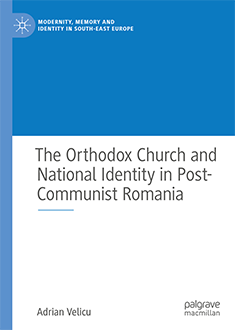Orthodox Christianity and National Identity in Post-89 Romania
The revival of the Orthodox Church in post-communist Romania brought along a renewed discourse on national identity. This study traces the Church’s arguments on identity, it explores the clergy’s deployment of the concept of Orthodoxy, along with Latin legacy, to legitimize the Church’s institutional aims and scrutinizes the workings of the discourse.

A survey of scholars’ and public intellectuals’ views on national, and indeed cultural, identity complements the Church’s views. The investigation attempts thus to offer an insight into the efforts of the Church to re-assert itself, given free rein in a post-dictatorial world of resumed and accelerated modernization. Scholars have drawn attention to the lack of studies on contemporary intellectual history in post-communist areas.
The juxtaposition of the Church’s and of the secular views on identity—occasionally, in dialogue with one another—examines the complexity of the intellectual context of the past three decades in Romania. The overviews of the Church’s and of the secular intellectuals’ opinions on national identity give an account of the various strands of thought on the issue. The final analysis employs a combination of methodological tools to examine the articulation and use of concepts against a background of political and social re-adjustment.

2020. The Orthodox Church and National Identity in Post-Communist Romania (Modernity, Memory and Identity in South-East Europe). London: Palgrave Macmillan.
2013. “The Moral Witness in Post-89 Romania,” in European Cultural Memory Post-89, eds. John Sundholm et al. Amsterdam: Rodopi.
2012. “Romania's Cultural Identity and the European Challenge: Convictions, Options, Illusions,” in Rethinking the Space for Religion: New Actors in Central and Southeast Europe on Religion, Authenticity and Belonging, eds. Catharina Raudvere, Krzysztof Stala and Trine Stauning Willert. Lund: Nordic Academic Press.
2011. “Cultural memory between the national and the transnational,” Journal of Aesthetics and Culture, vol. 3: 1-5.
2010. Civic Catechisms and Reason in the French Revolution. Farnham: Ashgate.
2010. “Post-89 Romania,” in 1989-2009: Incredibila aventura a democratiei dupa communism, eds. Lavinia Stan and Lucian Turcescu. Cluj: Institutul European.
2007. ”The Memory of Unexpressed Trauma. The Romanian 1960s,” in Collective Traumas: Memories of War and Conflict in 20th-Century Europe, eds. John Sundholm et al. Bruxelles: Peter Lang.
Contact
Adrian Velicu
Docent
University of Karlstad
